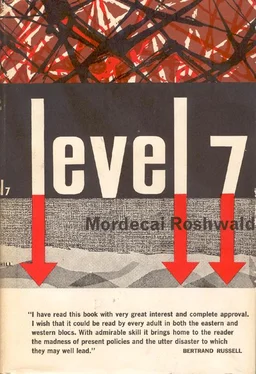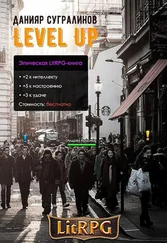LEVEL 7
by Mordecai Roshwald
My thanks are due to Jonathan Price for translating the original manuscript from my English into English and for making many valuable suggestions.
INTRODUCTION
How I started to write this diary
Some time has passed—thirty-seven days, to be precise—since I decided to write this diary and started to do so. It seems longer: these thirty-seven days have stretched out like eternity. My previous life passes before my mind as a recollected dream, a remote image, the life of another man. In a way, I got adjusted to my new life pretty quickly, though I am still far from feeling happy.
It is now, when my diary is already quite substantial, that it occurs to me that it should have some sort of introduction.
Introduction for whom? I ask myself. What chance is there that the diary will ever see daylight? I mean that literally. For my unknown and uncertain reader sometime in the future, this diary is being written in dungeons.
These dungeons are so deep underground that there is not the slightest chance of any ray of natural light penetrating into them. Not that we need daylight, of course. Our light down here is as strong as is desirable. It is scientifically adjusted to suit human needs. In some ways it is more perfect than sunlight: we get no gloomy days down here, and we never need sun-glasses. I’m told the temperature too is scientifically regulated—to 68 degrees, I believe. This must be the only place in the world where nobody ever talks about the weather. There isn’t any.
So here I am, 4,400 feet down inside the earth, with no chance of seeing sunshine again, writing a diary which probably no one will ever read. The idea of writing it occurred to me a few hours after I had come down. They were very hard hours—hours in which I realised that I shall never go back up to live on the surface of the earth again. But I must go back a bit to tell you how it happened.
The time was 8:00 a.m. and the date was March 21. I was sitting in my room at the PB (Push-Button) Training Camp. I had just had my breakfast, and I was in the act of glancing through the day’s work-programme when there came a knock at the door. A messenger poked his head in and said that the Commanding Officer wanted to see me at once. I glanced in the mirror, flicked a speck of dust off the sleeve of my uniform, took my cap down from the peg behind the door, and left the room.
I had no idea I was walking out of one life and into another. I didn’t even wonder much what the C.O. wanted to see me about. He quite often called one in without any advance warning. Sometimes it was for a fairly important matter—to say that you were to go on attachment to another training base, for example, or that you had been promoted, or that your work was not up to standard. Sometimes it was for one of his periodical inquiries about how you had spent your leave or week-end pass, to find out whether you had met anybody who seemed to be too interested in military secrets. And sometimes he called you in for a friendly-seeming chat without any apparent purpose, which made you wonder for the rest of the day whether he had had a hidden motive or was just plain bored and wanted somebody to talk to.
For the C.O. often was bored—lonely, anyway. As the administrative apex of a highly trained unit of military technicians, he was our superior in rank but inferior to us in technical education, in I.Q. and—so we thought—in his indispensability for modern warfare. So he was always obeyed, but seldom respected; and never treated as a friend. Our attitude probably resembled that of a bunch of Ivy-league college boys under a veteran sergeant who ruled as a god on the parade ground but with whom they would not have dreamt of associating in private. I wouldn’t know for certain because I never was an aristocrat and our instruction bore little resemblance to the old-time training for officers.
To get back to my story: when I was summoned to the C.O. that morning I had no idea what to expect. I thought vaguely that it might be something to do with my leave. For the last three months I had not been allowed off the camp—it had been the final phase of my training period. I had not even had a week-end away. I felt I deserved some leave. We had excellent facilities for leisure inside the camp, but even the inconveniences of life outside seemed attractive once in a while. Now that I am deep underground, even the restricted life of the camp seems almost unbearably attractive in retrospect. And as for a week-end free to go where I liked and do what I wanted—I daren’t think about it.
Anyhow, the notion that leave might be in store for me put me in a cheerful frame of mind as I walked over to the administrative block and entered the C.O.’s office. The C.O. was as quiet and controlled in his manner as ever, perhaps—so it seems to me now—even quieter and more controlled than usual. He asked me to take a chair, and then told me that the report on my final training was quite good. I was to be promoted to major, and would receive the increased pay which went with the rank. “As a matter of fact,” he added with a superior smile, “you’ll be getting rather more than I get, because of your technical qualifications.” I thanked him for the news, and thought how cleverly he camouflaged his feeling of inferiority.
“Now, your leave,” he went on, and my hopes rose. “Unfortunately,” and he paused on the word, conscious of having scored, “that will have to be postponed for a day or two. You have been ordered down.”
This meant underground, to the deep military installations of whose existence we trainees were, of course, aware, but which we had never seen.
“You’ll be able to gain first-hand knowledge of those matters with which your training up here has made you acquainted. And then,” with his sweetest smile, “you will be truly capable of fulfilling your duty and repaying your country for the money, time and energy it has invested in you.”
I swallowed that remark too. Coated, as it was, with the sweet sugar of higher rank and pay, it went down fairly easily.
“After you return from the trip down,” the C.O. concluded, “you will go on two weeks’ leave. This is a part of the order from above, which even I could not change if I wished to.” He could never say a pleasant thing without some bitter twist; but it did not worry me. I was already thinking about my leave—my ordered leave.
Did the C.O. know that this leave business was only a trick, part of the routine for taking me, and my fellows, smoothly down? I did not think so. He was just passing on orders which he, just then, understood as little as I did.
When I asked him at what time I was expected to leave, he told me that a car was already waiting for me outside his office. This struck me as rather unusual, for normally an order of this sort allowed some time for personal preparation. Still, one purpose of a military training is to accustom you to obeying orders without asking questions. I therefore accepted without query another curious fact: that I should take nothing with me, not even a toothbrush. “Everything will be provided on the spot,” said the C.O. “Just get into the car and go.”
This was becoming interesting. But there was no time for meditation. I stood up, saluted, left the office, stepped into the waiting car, and we were off. I remember glancing at my watch. The time was 8.30.
It was not until a few days later, after my destiny had been made known to me, that I understood the reason for this haste. The Supreme Command wanted to take no chances. It did not want the men and women who were ordered down to talk to anybody who was to remain. They had to be taken down directly, without any contact with friends and relations. The only man who knew that we—myself and some others from my camp—were going down was the C.O., and he could be relied upon to keep his mouth shut. Even the toothbrush I left had a function to fulfil. It would serve as evidence that my disappearance was purely accidental and unrelated to any military task. If I had been sent somewhere on duty, I would surely have taken my toothbrush with me. In short, my companions and I had to vanish as inconspicuously as possible, as if the earth had opened and swallowed us up. Which is precisely what happened.
Читать дальше





![Shin_Stark - В подземелье я пойду, там свой level подниму X [СИ]](/books/384602/shin-stark-v-podzemele-ya-pojdu-tam-svoj-level-po-thumb.webp)






